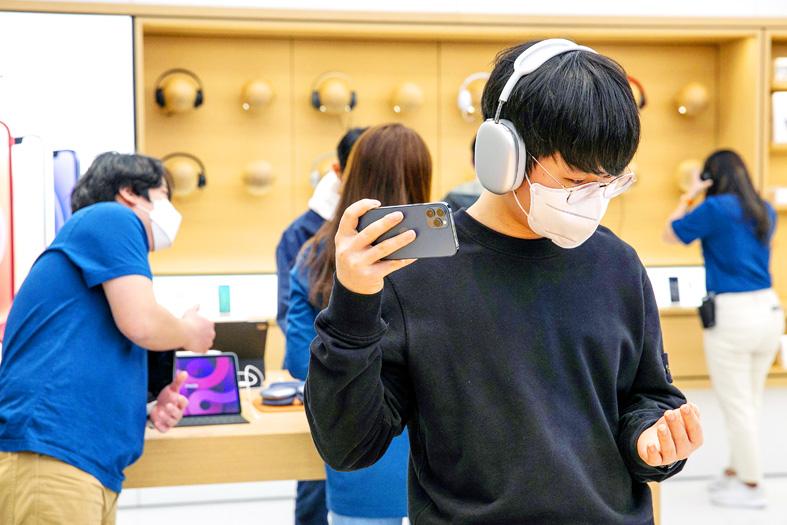Audio electronics maker Merry Electronics Co (美律) on Friday reported revenue of NT$1.99 billion (US$70.4 million) for last month, up 179.68 percent year-on-year, but down 38.97 percent month-on-month.
The Taichung-based company attributed the annual increase to significantly higher shipments of new earphone products by major customers, which were launched in September last year.
Rising sales of headsets amid the COVID-19 pandemic also contributed to the revenue growth, Merry said in a Taiwan Stock Exchange filing.

Photo: Bloomberg
The monthly decrease was due to the seven-day Lunar New Year holiday last month, resulting in fewer monthly working days compared with last year, when the holiday was in January, the firm said.
In the first two months, combined revenue rose 104.44 percent year-on-year to NT$5.24 billion, Merry said.
The firm supplies microphones, “true wireless stereo” (TWS) earphones, gaming headsets and Wi-Fi speakers to customers including Apple Inc, Sony Corp, Bose Corp, Logitech Co and Beats Electronics LLC.
Merry last month posted net profit of NT$577.986 million for last quarter, up 46.77 percent from the previous quarter’s NT$393.808 million.
Earnings per share rose to NT$2.79 from NT$1.91 in the third quarter last year, but gross margin declined to 11.88 percent from 12.37 percent due to an unfavorable product mix and a surge in the New Taiwan dollar, Merry said.
Revenue grew 25.16 percent last quarter from the previous quarter, up 47.5 percent from a year earlier to NT$12.69 billion, it said.
At an online earnings call on Feb. 26, the company forecast that first-quarter revenue would increase more than 50 percent year-on-year on strong demand for gaming headsets amid the work-from-home trend.
However, tight supply of semiconductor wafers might lead to industry-wide shortages of key components such as Bluetooth chips, microcontrollers, power management chips, digital signal processors and codecs, Merry said.
The component shortages are unlikely to be resolved in the near term, which might delay the launches of new products including high-end noise-canceling TWS earphones using Merry technology, Yuanta Securities Investment Consulting Co (元大投顧) said in a note on Wednesday
This might affect Merry’s gross margin in the first half of the year, Yuanta said.
However, revenue would fall less than expected, due to strong headphones demand, and gross margin would improve to 12.1 percent this quarter on a favorable product mix with higher sales exposure to high-margin headsets, it said.
“Given the seasonality of US handset brand’s shipments, we expect that speaker sales would fall this quarter. However, benefiting from the work-from-home trend and new gaming console launches by Sony Corp and Microsoft Corp, demand for audio and gaming headphones will likely remain robust,” Yuanta said.
First-quarter revenue would drop 33 percent from last quarter, significantly less than the declines of 40 to 50 percent in the slow seasons of previous years, it said.

Sweeping policy changes under US Secretary of Health and Human Services Robert F. Kennedy Jr are having a chilling effect on vaccine makers as anti-vaccine rhetoric has turned into concrete changes in inoculation schedules and recommendations, investors and executives said. The administration of US President Donald Trump has in the past year upended vaccine recommendations, with the country last month ending its longstanding guidance that all children receive inoculations against flu, hepatitis A and other diseases. The unprecedented changes have led to diminished vaccine usage, hurt the investment case for some biotechs, and created a drag that would likely dent revenues and

Macronix International Co (旺宏), the world’s biggest NOR flash memory supplier, yesterday said it would spend NT$22 billion (US$699.1 million) on capacity expansion this year to increase its production of mid-to-low-density memory chips as the world’s major memorychip suppliers are phasing out the market. The company said its planned capital expenditures are about 11 times higher than the NT$1.8 billion it spent on new facilities and equipment last year. A majority of this year’s outlay would be allocated to step up capacity of multi-level cell (MLC) NAND flash memory chips, which are used in embedded multimedia cards (eMMC), a managed

CULPRITS: Factors that affected the slip included falling global crude oil prices, wait-and-see consumer attitudes due to US tariffs and a different Lunar New Year holiday schedule Taiwan’s retail sales ended a nine-year growth streak last year, slipping 0.2 percent from a year earlier as uncertainty over US tariff policies affected demand for durable goods, data released on Friday by the Ministry of Economic Affairs showed. Last year’s retail sales totaled NT$4.84 trillion (US$153.27 billion), down about NT$9.5 billion, or 0.2 percent, from 2024. Despite the decline, the figure was still the second-highest annual sales total on record. Ministry statistics department deputy head Chen Yu-fang (陳玉芳) said sales of cars, motorcycles and related products, which accounted for 17.4 percent of total retail rales last year, fell NT$68.1 billion, or

In the wake of strong global demand for AI applications, Taiwan’s export-oriented economy accelerated with the composite index of economic indicators flashing the first “red” light in December for one year, indicating the economy is in booming mode, the National Development Council (NDC) said yesterday. Moreover, the index of leading indicators, which gauges the potential state of the economy over the next six months, also moved higher in December amid growing optimism over the outlook, the NDC said. In December, the index of economic indicators rose one point from a month earlier to 38, at the lower end of the “red” light.